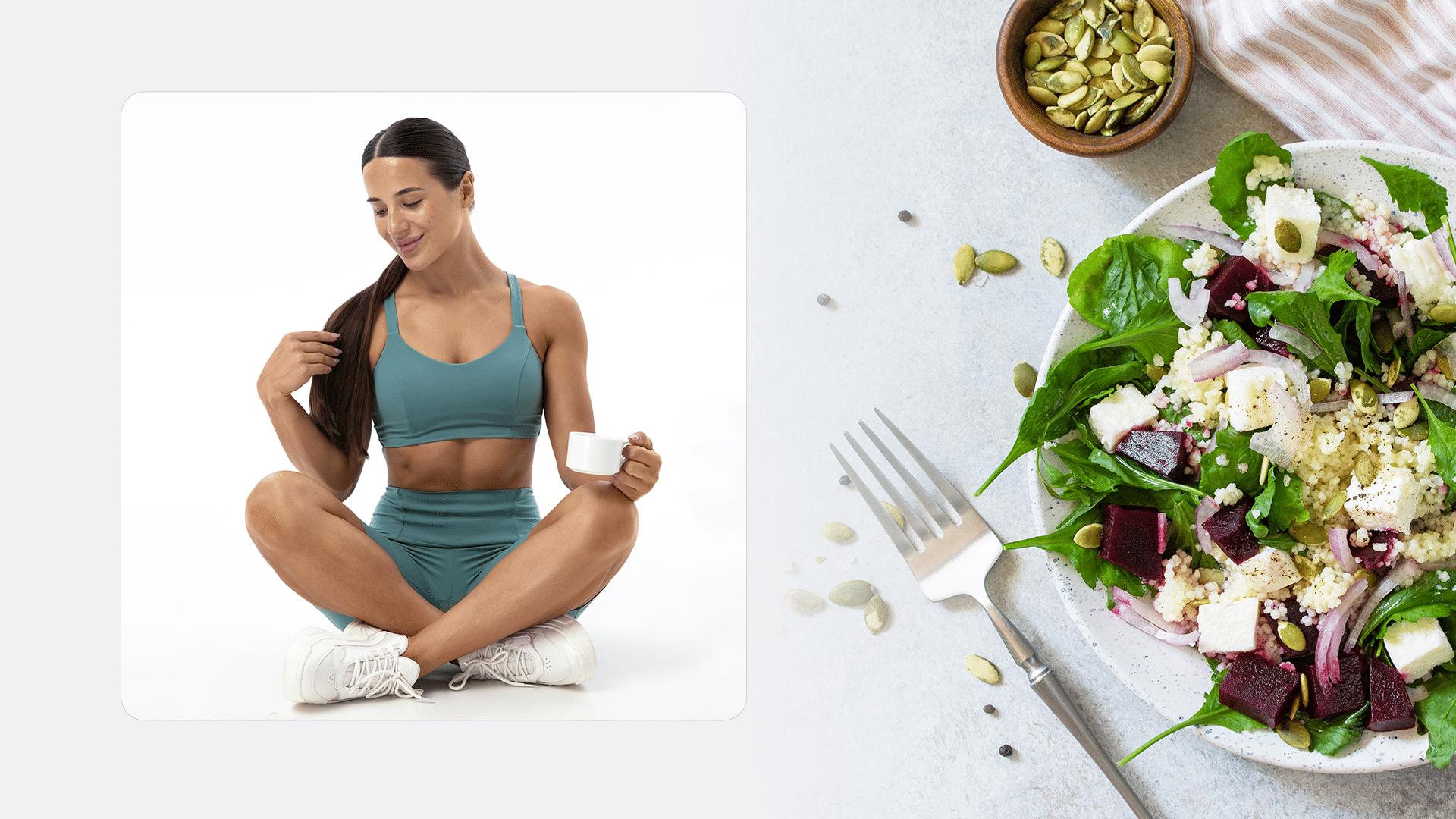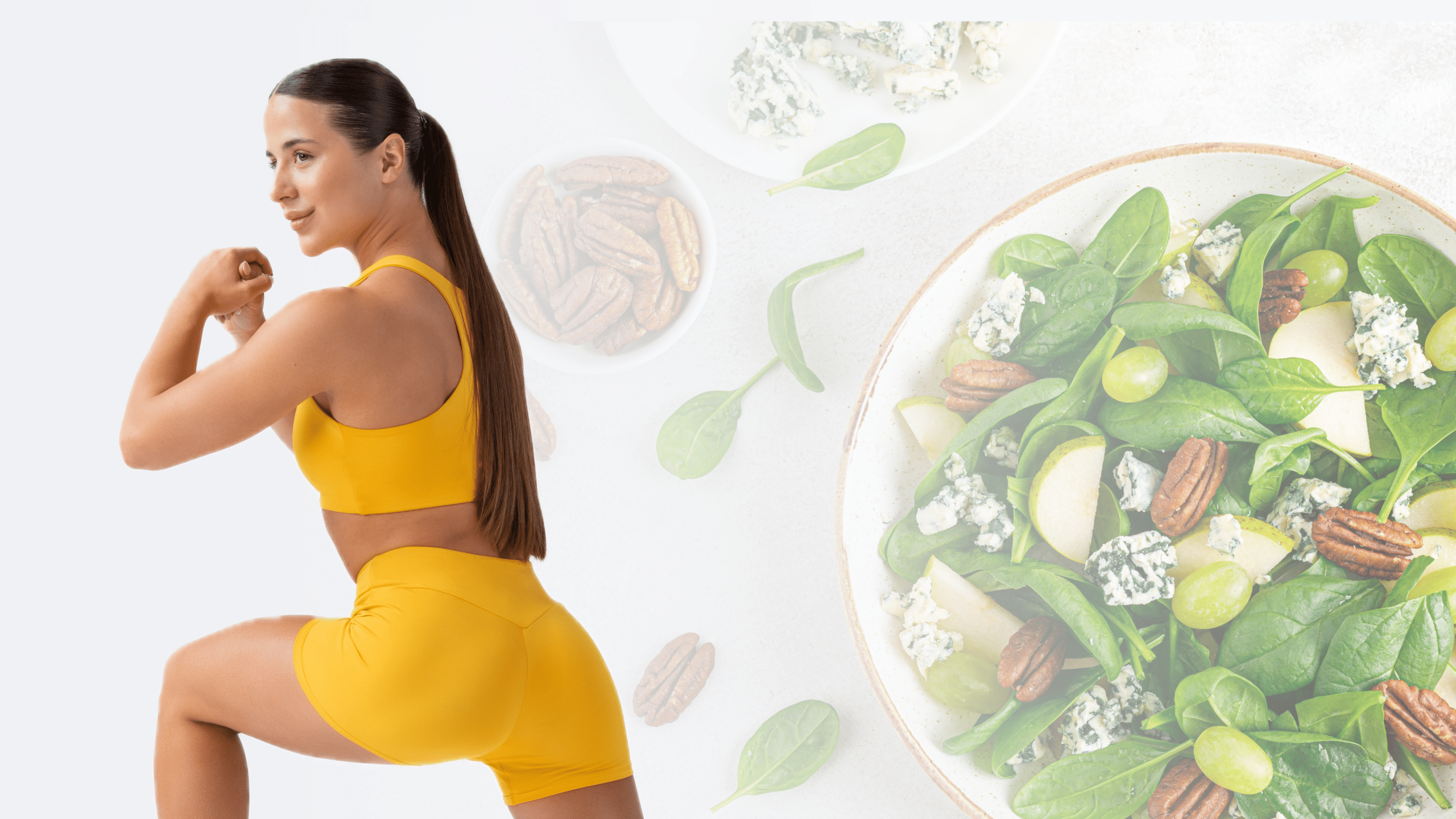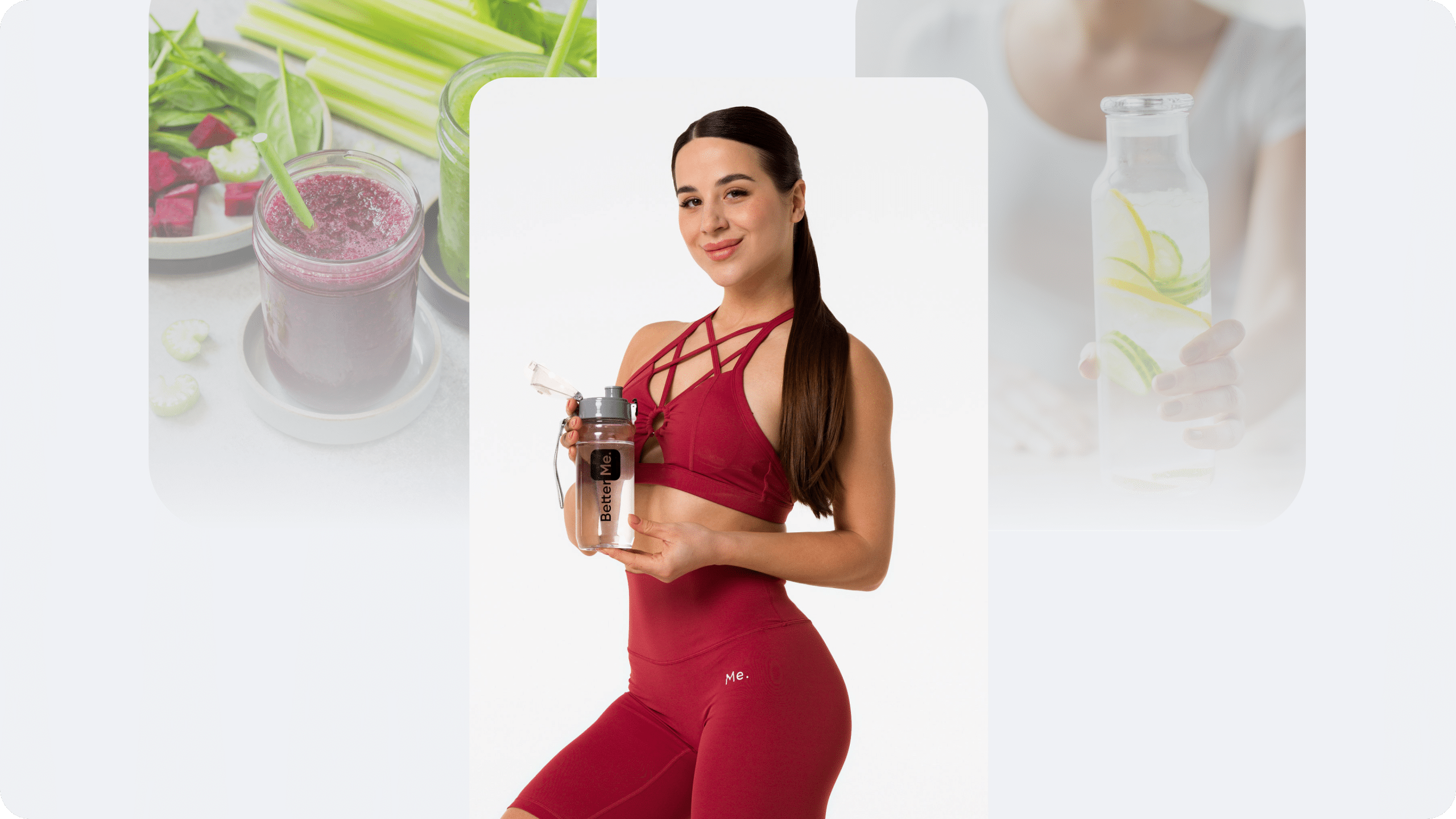Research suggests many benefits of plant-based diets – they may reduce the risk of chronic diseases, promote weight loss, and enhance overall health (1). For many people the choice to switch to a vegetarian lifestyle is driven by one or more of these compelling health benefits.
Combining these benefits with intermittent fasting – a dietary pattern where you alternate between periods of eating and fasting (10) – may seem like a winning formula for optimal health.
But it’s not all rosy.
While plant-based fasting can be a powerful tool for health improvement, there are some concerns that need to be addressed.
This guide will provide comprehensive insights into how to effectively integrate these two practices for maximum benefits, while also addressing potential pitfalls.
Can a Vegetarian Do Intermittent Fasting?
Yes, a vegetarian can certainly do intermittent fasting. In fact, plant-based diets are particularly well-suited for this dietary pattern as they tend to be high in fiber and complex carbohydrates, making them more filling and satisfying during the periods of eating (13).
In addition, plant-based foods are typically low in calories and high in nutrients, making it easier to stick to any calorie-restricted fasting plan when you are trying to lose weight.
However, there is one crucial factor that vegetarians need to consider when practicing intermittent fasting – protein intake.
Since plant-based diets tend to be lower in protein compared to animal-based ones, and protein plays a vital role in muscle maintenance and metabolism (4), it’s essential to ensure adequate protein intake during the eating periods.
BetterMe is your fast-track ticket to a long-lasting weight loss! Tailor your fitness journey and maximize your results with just a couple of swipes!
How to Get Enough Protein as a Vegetarian In Intermittent Fasting?
The best way to ensure adequate protein intake on a plant-based intermittent fasting diet is to include a variety of protein-rich plant-based foods such as beans, lentils, tofu, tempeh, nuts, and seeds in your meals.
You can also incorporate high-protein plant-based supplements like pea or soy protein powder into your smoothies or shakes.
Note that the recommended dietary allowance (RDA) for protein is 0.8 grams per kilogram of body weight, but your requirements may vary depending on your individual needs and activity level (5).
That said, make sure to consult a registered dietitian or nutritionist to determine the right amount of protein you need.
Potential Concerns with Plant-Based Intermittent Fasting
As mentioned earlier, there are some potential concerns with plant-based intermittent fasting that need to be addressed.
One of the main concerns is the risk of nutrient deficiency, especially for essential nutrients like iron, calcium, vitamin B12, and omega-3 fatty acids, which are more easily found in animal-based foods (8).
To mitigate this risk it’s crucial to choose a wide variety of whole plant foods and incorporate fortified foods or supplements as necessary.
Another concern is the potential for disordered eating patterns, particularly for individuals with a history of restrictive diets or eating disorders (9). Approach intermittent fasting with a balanced and mindful attitude, focusing on nourishing your body rather than restricting it, and if you have a history of an eating disorder, fasting is not recommended for you.
Rather than switching to both vegetarianism and Intermittent Fasting abruptly, it’s best to start with one, preferably the former, and gradually incorporate the later practice.
For example, you can start with a vegetarian diet for a few weeks or longer before introducing intermittent fasting gradually. The idea is to master one lifestyle change at a time for a more sustainable and successful transition.
To understand better if intermittent vegan fasting is right for you, check out our previous article – Is Vegan Intermittent Fasting the Right Choice for You?
Read more: Do Vegetarians Eat Fish
What’s a Good Vegetarian Intermittent Fasting Schedule?
There is no one-size-fits-all approach when it comes to intermittent fasting schedules, and the same goes for vegetarians. The most ideal fasting schedule is one that works best for your lifestyle and dietary preferences.
Some common options include:
-
14/10: Fasting for 14 hours and eating within a 10-hour window each day.
-
16/8 method: This involves fasting for 16 hours and eating within an 8-hour window each day. For example, you can fast from 8 pm to 12 pm the next day and have your meals between 12 pm and 8 pm.
-
18/6 method: Similar to the 16/8 method, but with a longer fasting period of 18 hours and an eating window of 6 hours.
-
20/4 method: This involves fasting for 20 hours and eating within a 4-hour window each day.
-
23/1 (OMAD): This is an extreme form of intermittent fasting where you only eat one meal a day (OMAD) and fast for 23 hours.
-
5:2 diet: This involves eating normally on five days of the week and restricting calorie intake (500-600 calories) on two non-consecutive days.
-
Alternate-day fasting: This involves alternating between fasting days (eating very few calories) and feasting days (eating normally).
What Vegetarian Food Breaks a Fast?
Any food that contains calories or causes an increase in insulin levels can break a fast. This includes foods like fruits, vegetables, and plant-based milk alternatives.
However, there are certain vegetarian-friendly options that can be consumed during the fasting periods while still maintaining the benefits of intermittent fasting. These include:
-
Black coffee or tea without any added sugar or creamer
-
Green tea, and herbal teas such as peppermint or chamomile without any sweeteners
-
Sparkling water and regular water without any added sweeteners
-
Water with no more than a squeeze of lemon or lime juice for flavor
Avoid any solid food during fasting periods and stick to calorie-free beverages for optimal results.
If you’ve mustered up the courage to crush your weight loss goal, let Betterme take the sting out of this demanding process. Our app will help you restructure your habits, remold your life and crank up your fitness results!
7-Day Vegetarian Intermittent Fasting Meal Plan
To help you get started, here’s a simple 7-day intermittent fasting vegetarian meal plan.
This plan follows a vegetarian intermittent fasting 16/8 schedule, but feel free to adjust the fasting period according to your needs. Remember to adjust the portion sizes according to your individual needs and calorie requirements.
Day 1
-
Meal 1 (12 pm): Overnight oats with almond milk, chia seeds, and mixed berries
-
Meal 2 (4 pm): Roasted chickpeas with a side salad of mixed greens, tomatoes, cucumbers, and a homemade vinaigrette dressing
-
Meal 3 (7 pm): Baked tofu with stir-fried vegetables and brown rice
Day 2
-
Meal 1 (12 pm): Avocado toast with whole-grain bread, mashed avocado, and scrambled eggs
-
Meal 2 (4 pm): Carrot sticks with hummus dip
-
Meal 3 (7 pm): Vegetarian chili made with beans, tomatoes, bell peppers, and spices, served with a side of quinoa
Day 3
-
Meal 1 (12 pm): Spinach and mushroom omelet with whole-grain toast
-
Meal 2 (4 pm): Apple slices with almond butter
-
Meal 3 (7 pm): Lentil soup served with a side of whole-wheat pita bread
Day 4
-
Meal 1 (12 pm): Banana smoothie made with banana, almond milk, spinach, and protein powder
-
Meal 2 (4 pm): Greek yogurt with mixed berries and a sprinkle of nuts
-
Meal 3 (7 pm): Grilled tofu skewers with grilled vegetables and a side of quinoa
Day 5
-
Meal 1 (12 pm): Whole-grain pancakes topped with fresh fruit and a drizzle of maple syrup
-
Meal 2 (4 pm): Roasted edamame beans
-
Meal 3 (7 pm): Whole-grain pasta with marinara sauce and sautéed vegetables
Day 6
-
Meal 1 (12 pm): Vegetable frittata made with eggs, bell peppers, onions, mushrooms, and spinach
-
Meal 2 (4 pm): Celery sticks with almond butter
-
Meal 3 (7 pm): Baked sweet potato topped with black beans, avocado, salsa, and Greek yogurt
Day 7
-
Meal 1 (12 pm): Mushroom and spinach quiche made with whole-grain crust
-
Meal 2 (4 pm): Banana with almond butter
-
Meal 3 (7 pm): Grilled portobello mushroom burgers with a side of sweet potato fries
Even with the above 7-day meal plan for intermittent fasting vegetarian, you have the flexibility to swap out ingredients and create your own recipes. For healthy snack ideas, check out our post on intermittent fasting snacks.
The key is to ensure that you are getting enough nutrients, protein, and healthy fats during your eating window to maintain a balanced diet.
Read more: A Comprehensive Guide to Zinc-Rich Foods for Vegetarians
Tips for Vegetarian Intermittent Fasting for Beginners
In theory, vegetarian intermittent fasting seems quite straightforward; however, there are a few tips to keep in mind when starting this lifestyle:
Get to Know Your Body
Understanding your body’s cues is crucial when you start with intermittent fasting. You should know the difference between actual hunger and boredom or emotional eating. Listen to your body and try to eat only when you’re genuinely hungry, during your feasting window.
Hydrate Constantly
Water is your best friend during fasting hours. It not only keeps you hydrated but can also help curb hunger pangs (7). Don’t forget herbal teas and black coffee – just avoid adding sugar or milk, and don’t overdo it on the caffeine.
Plan Your Meals
Planning your meals in advance can help prevent overeating during your eating window. Make sure your meals are balanced with ample protein, fiber, and healthy fats to keep you satiated (13).
Here’s a detailed 16:8 intermittent fasting 7-day meal plan to get you started.
Don’t Skimp on Protein
As a vegetarian, it’s crucial to make sure you’re getting enough protein, which can be a bit challenging. Include protein-rich foods like lentils, chickpeas, and tofu in your meals.
Manage Your Exercise Routine
Timing your workouts just before your first meal is said to maximize fat loss, but eating before exercise can help fuel your workout and improve performance. It’s essential to understand your body’s limits. If you feel weak or dizzy during workouts while fasting, adjust your schedule.
Start Slow
There’s no need to dive into the deep end right away. Begin with shorter fasting periods, gradually increasing them as your body adjusts. You don’t have to fast every day; even a couple of days a week can bring benefits!
Don’t Obsess Over the Clock
While timing is essential during intermittent fasting, don’t let it stress you out. If you need to adjust your window or break your fast an hour early, it’s not the end of the world. A flexible approach is more sustainable in the long run.
Practice Mindful Eating
During your eating window, avoid distractions, savor your food, and pay attention to your body’s fullness cues. This practice can enhance your fasting experience and promote a healthier relationship with food (12).
FAQs
Do Vegetarians Lose Weight Faster Than Meat Eaters?
While it’s a common perception that vegetarians may lose weight faster, the truth is that weight loss depends on various factors, including caloric intake, physical activity level, metabolic rate, and genetics.
However, vegetarian diets are often rich in fiber and low in unhealthy fats, which may promote satiety, reduce caloric intake, and subsequently foster weight loss (6).
But remember, eating a balanced diet and maintaining a healthy lifestyle is key to any effective weight management strategy (16), whether vegetarian or not.
Do Vegetarians Go into Ketosis?
Ketosis is a metabolic state where the body primarily burns fat for energy rather than carbohydrates (11). While it’s commonly associated with a ketogenic diet that is high in fat and low in carbs, vegetarians can also achieve ketosis.
By limiting carbohydrate intake and consuming ample healthy fats and moderate protein from plant-based sources such as avocados, nuts, seeds, and tofu, vegetarians can stimulate the body to enter into a state of ketosis, if that is their goal.
Will I Lose Weight Faster on a Vegetarian Diet?
A vegetarian diet may aid in weight loss due to its emphasis on whole grains, fruits, vegetables, and plant-based proteins that are typically lower in calories and fat than meat-based diets (15).
They are also rich in fiber, which can promote feelings of fullness and reduce overall calorie consumption (3).
However, the speed and extent of weight loss will vary between individuals and depend on overall lifestyle factors such as physical activity and portion control.
Bear in mind that not all vegetarian food is healthy or low in calories; ultra processed foods, sweets, and high-fat foods can still contribute to weight gain, even on a vegetarian diet.
What Is a Vegan Face?
“Vegan face” is a term that has been coined to describe the clear, radiant complexion many people notice after switching to a vegan diet. This is believed to be due to the high intake of fruits, vegetables, and whole grains, which are rich in antioxidants that may help protect the skin from oxidative damage (14).
Moreover, eliminating dairy, which some research suggests may contribute to acne (2), can also lead to clearer skin for some people. That said, skin health is influenced by many factors, including genetics, environmental factors, and overall health.
The Bottom Line
Combining a plant-based diet with intermittent fasting can be an excellent way to aim for overall health improvement.
However, it’s essential to pay attention to protein intake and potential concerns like nutrient deficiencies and disordered eating patterns.
By making informed choices and consulting a healthcare professional if needed, you can effectively integrate these two practices for optimal health benefits.
DISCLAIMER:
This article is intended for general informational purposes only and does not address individual circumstances. It is not a substitute for professional advice or help and should not be relied on to make decisions of any kind. Any action you take upon the information presented in this article is strictly at your own risk and responsibility!
SOURCES
-
A Look at Plant-Based Diets (2021, ncbi.nlm.nih.gov)
-
Dairy intake and acne development: A meta-analysis of observational studies (2019, pubmed.ncbi.nlm.nih.gov)
-
Dietary fibre and satiety (2007, onlinelibrary.wiley.com)
-
Dietary Protein and Muscle Mass: Translating Science to Application and Health Benefit (2019, mdpi.com)
-
Dietary protein intake and human health (2016, pubs.rsc.org)
-
Effects of Plant-Based Diets on Weight Status: A Systematic Review (2020, ncbi.nlm.nih.gov)
-
Immediate pre-meal water ingestion decreases voluntary food intake in lean young males (2016, pubmed.ncbi.nlm.nih.gov)
-
Intake and adequacy of the vegan diet. A systematic review of the evidence (2021, sciencedirect.com)
-
Intermittent fasting: consider the risks of disordered eating for your patient (2023, biomedcentral.com)
-
Intermittent fasting: the science of going without (2013, ncbi.nlm.nih.gov)
-
Ketogenic Diet (20323, ncbi.nlm.nih.go)
-
Mindful Eating: The Art of Presence While You Eat (2017, ncbi.nlm.nih.gov)
-
Optimising foods for satiety (2015, sciencedirect.com)
-
Plant-Based Foods for Skin Health: A Narrative Review (2022, sciencedirect.com)
-
Vegetarian Diets and Weight Reduction: a Meta-Analysis of Randomized Controlled Trials (2015, ncbi.nlm.nih.gov)
-
Weight-Loss and Maintenance Strategies – Weight Management (2004, ncbi.nlm.nih.gov)
A Look at Plant-Based Diets (2021, ncbi.nlm.nih.gov)
Dairy intake and acne development: A meta-analysis of observational studies (2019, pubmed.ncbi.nlm.nih.gov)
Dietary fibre and satiety (2007, onlinelibrary.wiley.com)
Dietary Protein and Muscle Mass: Translating Science to Application and Health Benefit (2019, mdpi.com)
Dietary protein intake and human health (2016, pubs.rsc.org)
Effects of Plant-Based Diets on Weight Status: A Systematic Review (2020, ncbi.nlm.nih.gov)
Immediate pre-meal water ingestion decreases voluntary food intake in lean young males (2016, pubmed.ncbi.nlm.nih.gov)
Intake and adequacy of the vegan diet. A systematic review of the evidence (2021, sciencedirect.com)
Intermittent fasting: consider the risks of disordered eating for your patient (2023, biomedcentral.com)
Intermittent fasting: the science of going without (2013, ncbi.nlm.nih.gov)
Ketogenic Diet (20323, ncbi.nlm.nih.go)
Mindful Eating: The Art of Presence While You Eat (2017, ncbi.nlm.nih.gov)
Optimising foods for satiety (2015, sciencedirect.com)
Plant-Based Foods for Skin Health: A Narrative Review (2022, sciencedirect.com)
Vegetarian Diets and Weight Reduction: a Meta-Analysis of Randomized Controlled Trials (2015, ncbi.nlm.nih.gov)
Weight-Loss and Maintenance Strategies – Weight Management (2004, ncbi.nlm.nih.gov)














